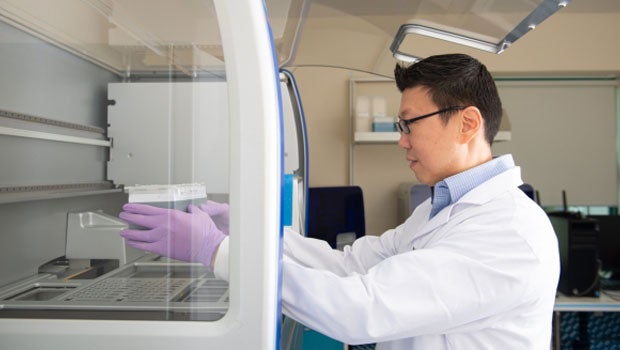
Armed with scientific rigour, passion and perseverance, Associate Professor Ong Choon Kiat hopes to change the course of treatment for those with cancer.
With more than two decades in the field of cancer research, Associate Professor Ong Choon Kiat, Principal Investigator of the Lymphoma Genomic Translational Research Laboratory at the National Cancer Centre Singapore (NCCS), is no stranger to hard work.
His passion for scientific enquiry began when he was a young boy growing up on Pulau Ubin surrounded by nature. This drove his interest to want to better understand the world around him, eventually taking the path to study science. The sparks of passion have kindled into fires of purpose over the years in his role at NCCS.
“The opportunity to change a patient's treatment and the outcome of the disease means a lot to me," he said of his work at the NCCS Lymphoma Genomic Translational Research Laboratory.
Get updates on Tomorrow's Medicine in your mailbox!
Click here to subscribe
Moving research from the lab to the bedside
"Translational research is basically about translating our research findings into clinical treatment to improve patient outcomes," he explained. For example, in 2016, his team discovered a mutation in the PD -L1 gene of patients with natural-killer/T-cell lymphoma (NKTCL), that could predict whether the patient would respond to immunotherapy, a treatment that activates the body's natural immune system.
This finding is particularly important because NKTCL, a common cancer in Asia that often occurs in the nose, has an extremely poor prognosis. For those treated with standard chemotherapy or radiation therapy, the five-year global survival rate is 70 per cent in the early stage, and less than 50 per cent in the late stage of the disease.
Working with co-author Prof Lim Soon Thye, Deputy Chief Executive Officer (Clinical) and Senior Consultant, NCCS, Assoc Prof Ong and the team discovered a genetic biomarker which enables clinicians to identify those who respond to immunotherapy, and offers new hope to NKTCL patients who have relapsed. In 2017, SingHealth filed a patent for this discovery, and entered into a licensing agreement with biotech company, Lucence Diagnostics, to develop a diagnostic test that can determine which patients will benefit from the treatment.
In a separate study, the team also analysed the mutations in NTKCL tumours of 260 patients from Singapore, China, Belgium and Taiwan to develop a Genomic Prognostic Model (GPM), comprising 13 prognostic genes that can effectively predict the worst clinical outcomes. The findings can be used for early identification of patients likely to have poor outcomes before they relapse so they can start treatment with more aggressive targeted therapy earlier.
How hope can set off a cascade of change
Assoc Prof Ong shared that the NKTCL studies were especially memorable for him, because it is a reminder of the importance of perseverance.
After all, the research was motivated by a patient who refused to give up despite exhausting all other therapeutic options, and turned to immunotherapy—previously used for melanoma patients as a last resort. When the treatment worked and the cancer regressed, Assoc Prof Ong and his team began their genetic sleuthing to understand why.
“Seeing patients achieve a complete response to the treatment always brings joy to my work as a researcher. It encourages me to keep striving harder and is a constant reminder of why I do research,” he said.
In addition, the studies also epitomised his belief that “to solve a challenging research problem, we need lots of different expertise, and must acknowledge that our own knowledge is limited and we need the contributions of others”.
This is seen in how the GPM study involved multiple collaborators from Singapore General Hospital (SGH), National University Cancer Institute, Singapore (NCIS), A*STAR’s Genome Institute of Singapore (GIS) and researchers from China, Hong Kong and South Korea.
Assoc Prof Ong explained that as Singapore’s population is small and NKTCL is a sub-type of lymphoma, it was by collaborating with researchers from abroad that his team gained access to a larger pool of data, which ultimately led to their breakthrough.
The collaborative research effort was supported by the National Research Foundation Singapore’s Open Fund-Large Collaborative Grant, administered by the Singapore Ministry of Health’s National Medical Research Council (NMRC), the Tanoto Professorship in Medical Oncology and a number of other funding sources.

Assoc Prof Ong Choon Kiat (last row, third from right) with research team members from the Lymphoma Genomic Translational Research Laboratory
Reflections over the decades
Reflecting on the turning points in his career, Assoc Prof Ong mused that he is an advocate for teamwork, not merely because of the scientific progress it enables, but also because of the support it can provide individual researchers.
He shares that in his own personal journey, Prof Lim Soon Thye reached out with the opportunity to head his own laboratory while Prof Teh Bin Tean, Deputy Chief Executive Officer (Research), NCCS, has provided valuable mentorship.
Sharing that the NKTCL study was sparked by hope that set off a cascade of change, his advice to current and future researchers is to, “Embrace that team science is the way forward, find your passion, and most importantly, always persevere because you never know if the breakthrough that you seek is just around the corner.”
Get updates on Tomorrow's Medicine in your mailbox!
Click here to subscribe













 Get it on Google Play
Get it on Google Play